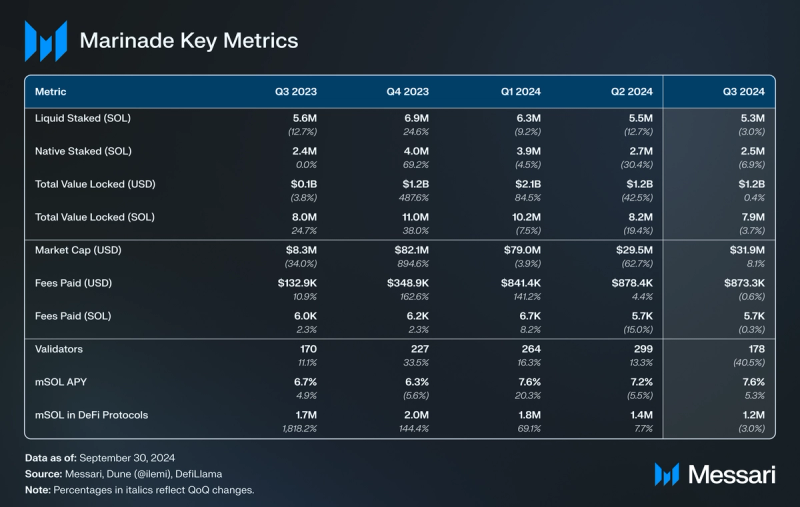Key Insights
- Marinade’s Total Value Locked (TVL) increased by 9% QoQ to $849.3 million. Native staking now comprises 31% of Marinade’s TVL.
- Protected Staking Rewards (PSR) safeguarded staker yields, recovering 1,200 SOL in Q3. PSR requires validators to put up a SOL bond to be eligible for a stake in Marinade.
- mSOL deposits in DeFi fell 3% QoQ to 1.2 million. Kamino led TVL for the second quarter in a row with 357,900 mSOL.
- Marinade removed the 6% stake fee from its liquid staking product, meaning its remaining revenue was generated from unstacking and the Stake Auction Marketplace.
- Total Staked SOL fell 4% QoQ to 7.9 million in Q3. Including native staking, Marinade holds a 33% market share against Solana liquid staking providers.
Primer
Marinade (MNDE) is an automated staking protocol on Solana that provides liquid and native staking solutions. Marinade was founded during the March 2021 Solana x Serum Hackathon and launched on mainnet on August 2, 2021. Marinade’s governance token MNDE was released a few months later, with a retroactive airdrop for Marinade SOL (mSOL) holders. Marinade has not raised venture capital funding or conducted public token sales. Instead, Marinade’s native token MNDE has mainly been distributed via various campaigns to reward users and contributors. Beyond incentives, MNDE is used to govern Realms. Previously, Marinade delegates staked SOL to validators based on its algorithmic delegation strategy (60%) and MNDE and mSOL directed stake (20% each), where tokenholders can vote for specific validators or the algorithmic set. After Q2, the delegation strategy was updated with a Stake Action Marketplace where validators bid on stakers SOL deposits. For both the algorithmic strategy and directed stake, validators need to meet specific criteria for eligibility, notably a maximum 7% commission. In April 2024, Marinade launched Protected Staking Rewards (PSR), which also requires validators to put up a SOL bond to be eligible for a stake in Marinade. PSR enforces an onchain service-level agreement protecting stakers from reduced rewards.
Website / X (Twitter) / Discord
Key Metrics
Performance Analysis
TVL
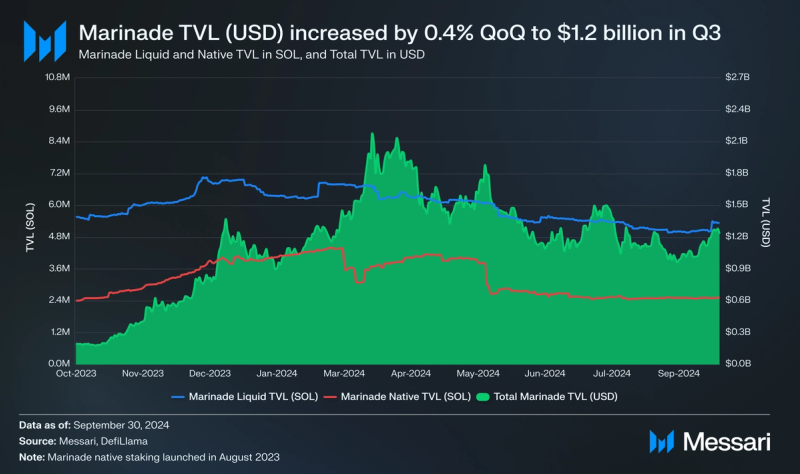
Marinade’s TVL increased by 0.4% QoQ to $1.2 billion in Q3. When denominated in SOL, TVL increased by 4% to 7.9 million. Total Marinade TVL is typically correlated to Solana TVL, which decreased by 9% QoQ to $4.5 billion.
Marinade operates two separate staking products: liquid and native staking.
Marinade liquid staking allows users to stake their SOL for mSOL, which provides all the benefits of native staking yield and enables users to participate in DeFi with their receipt token. Native Marinade Liquid’s TVL fell by 3% to 5.3 million SOL.
Marinade Native launched in Q3 2023, allowing users to stake SOL directly without losing custody of their keys. This strategy may be more attractive to institutional investors, who are typically less tolerant towards the smart contract risk of liquid staking or the high concentration risk of relying on the performance of a custodian solution or single validator. Native staking comprises 32% of Marinade’s total TVL. Marinade Native’s TVL fell 7% to 2.5 million SOL; however, TVL (USD) is up 525% YoY.
Marinade Native launched in Q3 2023, allowing users to stake SOL directly without losing custody of their tokens. This strategy may be more attractive to institutional investors, who are typically less tolerant towards the smart contract risk of liquid staking or the high concentration risk of relying on the performance of a single validator. Native staking comprises 31% of Marinade’s total TVL.
Market Cap and Fees
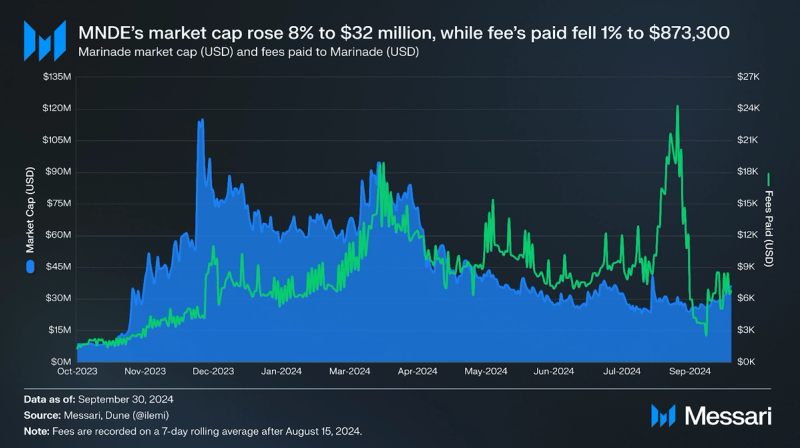
In Q3, Marinade’s market cap increased 8% QoQ to $31.9 million. MNDE currently has a fixed supply of 1 billion tokens, of which 266 million are circulating. 12 million tokens were unlocked in Q3, and an additional 11 million are slated to be unlocked in Q3.
Total revenue for Marinade in Q3 was $873,300, a 1% decrease QoQ. Marinade collected most of its revenue from a 6% staking fee on Marinade Liquid rewards (which translates to a ~0.42% fee on staked SOL, assuming a 7% APY). Marinade removed the stake fee on August 20, which noticeably impacted Q3 revenue; fees from staking fell by 50% QoQ to $439,100. Marinade also earns revenue from unstaking fees ranging from 0.1-9% based on the total liquidity available in the mSOL/SOL LP and the unstaked amount. Fee growth is highly correlated with Marinade Liquid TVL growth, although the decrease in fees collected was partially due to a lower median SOL price, which was $148 in Q3 compared to $151 in Q2.
Marinade also earns fees through its Stake Auction Marketplace (SAM), where it takes a cut from validator bids. SAM launched on August 14. In half a quarter, Marinade earned 2,792 SOL from SAM, which accounted for nearly half of all revenue generated in Q3.
Validators and APY
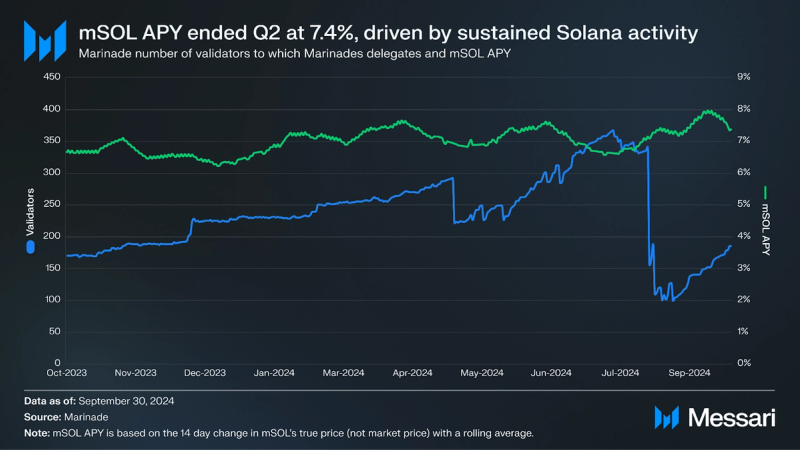
mSOL APY increased by 5% QoQ to 7.6%. Concurrently, network activity on Solana increased across several metrics in Q3, including average daily fee payers, average transaction fees, and TVL. Validators earn staking rewards based on network performance and activity. When Solana experiences higher transaction volumes, validators process more transactions, which increases the amount of SOL distributed as rewards. SOL’s annualized inflation rate is at 4.8%. The mSOL APY figure is calculated based on mSOL’s “true price,” i.e., SOL in Marinade staking pool / mSOL minted.
Native staking through Marinade typically yields a slightly higher APY because native stakers aren’t paying the same fees as with mSOL. However, with native staking, SOL is locked up and cannot be used in DeFi applications until it is unstaked and goes through the cooldown period.
Marinade delegates SOL to 178 validators, a 41% QoQ decrease. The decrease in validators follows a recent upgrade to the delegation strategy that tied validator growth to Marinade’s TVL strategy. In July, Marinade released a network page covering key metrics, including validator scores, location, and profitability. The validator commission has also been capped at 7%, down from 10%.
Protected Staking Rewards (PSR) was launched in April 2024, with over 400 validators participating from the outset. PSR enforces an onchain service-level agreement protecting stakers from reduced rewards for validator performance issues or commission rugs. PSR requires validators to put up a bond to be eligible for Marinade stake. This allows Marinade to stake to more validators without sacrificing APY to stakers. On September 21, Marinade reported they recovered 1,200 SOL for Marinade stakers with PSR.
Delegation Strategy V2
In May, a successful proposal to restructure Marinade’s delegation strategy passed. The new strategy introduced the Stake Auction Marketplace (SAM).
The Stake Auction Marketplace (SAM) allows validators to bid for stakes. Each validator in the Marinade delegation set will only pay as much as the least-yielding validator in the delegation set. Validators with higher amounts of stake will still have the potential to earn greater rewards in addition to perks like priority fees. SAM aims to improve staker’s APY by pushing validators to share a percentage of revenue via bidding on stake. This protects stakers from MEV, which accounts for millions of dollars lost weekly. Additionally,
The first phase of SAM went live on June 27, allowing validators to test the bidding system and generate simulated results using different bid sizes. The second phase went live on August 14, transitioning SAM from a simulation environment to a live marketplace. Phase 3 is slated to roll out by mid-Q4 or later and will focus on redelegation improvements.
mSOL in DeFi
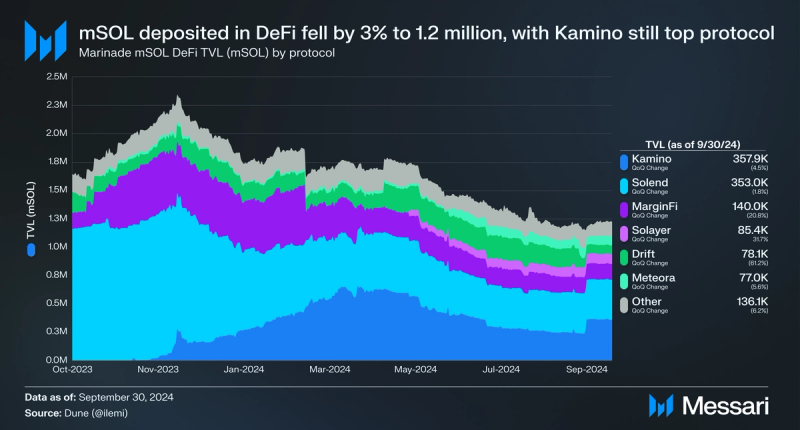
mSOL deposited in DeFi protocols decreased by 3% QoQ to 1.2 million, potentially driven by updates and changes within each protocol:
- Kamino maintained its majority share of mSOL in DeFi for the second quarter in a row. Kamino leads TVL on Solana, with a 57% growth rate QoQ to 357,900 mSOL. In September, Kamino launched Kamino Lend V2, which introduced permissionless market creation and aggregated liquidity through a vault layer.
- Drift, the 7th largest protocol on Solana by TVL, ended Q3 with 78,100 mSOL, a 61% decrease QoQ in supply. Comparatively, JitoSOL fell 28% QoQ to 658,600 tokens, while DSOL (Drift Staked SOL) increased 2,629% QoQ to 155,300 tokens.
- Solend previously featured the majority share of mSOL in DeFi, but Kamino surpassed it in Q1. In Q3, Solend mSOL supply decreased by 2% QoQ to 353,000 mSOL. Solend announced they are rebranding to Save in July, with plans to launch a native stablecoin called sUSD.
- Solayer, a restaking network on Solana, launched at the end of May. Solayer’s mSOL supply grew 34% QoQ to 85,400 mSOL. In August, Solayer announced a $12 million fundraising round led by Polychain.
A proposal for Marinade Earn Season 3 was passed in Q2. Previous seasons allowed tokenholders to earn simply by staking SOL for mSOL; season 3 required mSOL tokenholders to deepen liquidity by participating in DeFi. Throughout Marinade Earn season 3 (which includes Q3 and Q4), Marinade distributed 13.6 million MNDE tokens to mSOL tokenholders. 25 million MNDE tokens were budgeted for season 3, so over half of the budget remains unspent.
- Kamino received 8.3 million tokens in emissions.
- Save (previously Solend) received 3.6 million tokens in emissions.
- Raydium received 400,000 tokens in emissions.
Competitive Landscape
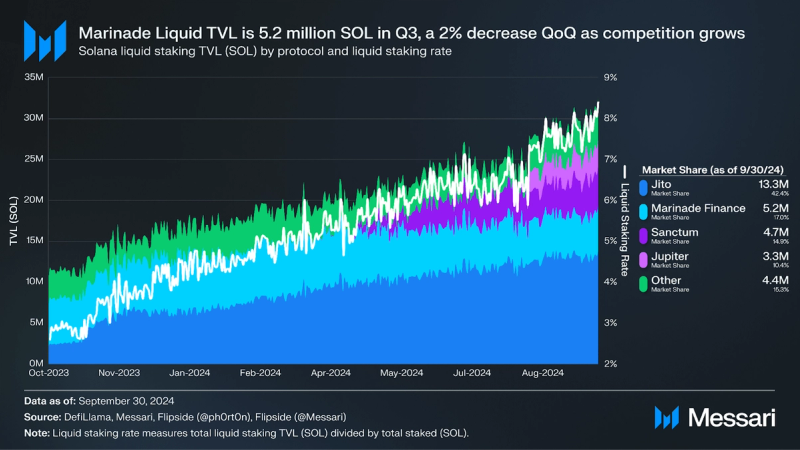
Solana’s liquid staking rate (the percent of liquid-staked SOL) increased by 31% QoQ to 8.4%. With 66% of eligible SOL supply staked, the liquid staking rate must continue growing to enable an ecosystem built on yield-bearing SOL.
The top competitors for Marinade Liquid Staking include Jito, Sanctum, and Jupiter. Marinade’s market share fell by 6% QoQ to 17%, with Jito’s flat at 42%. Including Marinade Native, which accrued 2.5 million staked sol, Marinade’s market share in Q3 was 33%.
Jito’s jitoSOL remained Solana’s LST leader. The JitoSOL supply grew 26% QoQ to almost 13.3 million SOL, giving it a 47% market share. In Q3, the Jito Stake Pool transferred management to StakeNet, an open-source protocol designed to support the decentralization of the Solana network. Jito also introduced restaking infrastructure to support the creation and operation of LRTs on Solana.
Sanctum LSTs ended Q3 with 4.7 million SOL, a 41% increase QoQ. The Sanctum Infinity Pool, a multi-LST liquidity pool containing 73 LSTs at the end of Q3, saw a 40% decrease QoQ with 1.3 million SOL in TVL. The pool prices LSTs by its “floor price” relative to SOL, allowing any LST in the pool to tap into any other’s liquidity. For example, if a user wants to sell xSOL for USDC, but no xSOL/USDC pool exists, xSOL could be swapped to ySOL and sold to USDC using the ySOL/USDC pool. The top Sanctum LST is Jupiter’s JupSOL, which ended Q3 with a supply of 3.3 million SOL, a 44% increase QoQ. Other popular Sanctum LSTs include Helius’s hSOL and Solana Compass’ compassSOL.
While Sanctum benefits Marinade by increasing liquidity for mSOL, it may also disadvantage Marinade as one of the market leaders. Sanctum products lower the barriers to launching LSTs, enabling experimentation and expanding the design space of LST functionality. Marinade’s PSR feature could provide a defensible moat against new entrants: SOL stakers are more incentivized to stake with one of Mariinade’s validators if PSR generates additional yield. Validators may also be less likely to provide a bond for a liquid staking protocol that is not yet delegating a meaningful amount of SOL.
For Marinade Native Staking, the top competitors include Helius, Coinbase, and Galaxy, each consuming a generous amount of Solana’s native staking market share. While these three organizations have a higher distribution and access to idle Solana capital, they do not provide non-custodial staking or diversification across multiple validators. Ultimately, Marinade’s competitive edge is its prioritization of security without sacrificing yield; the success of the native staking product lies in its ability to capture institutional clients.
Closing Summary
Marinade’s Q3 2024 performance highlights its resilience and innovation. Total Value Locked (TVL) increased 9% QoQ to $849.3 million, while mSOL APY grew 5% to 7.6%. Marinade maintained a 33% combined market share despite a 6% decline in liquid staking. Key upgrades like Protected Staking Rewards (PSR) and the Stake Auction Marketplace (SAM), which went live in August, focused on staker protection and validator accountability.
The Solana liquid staking market has become increasingly competitive in recent quarters, with competitors like Jito, Jupiter, and Sanctum growing their market share. Marinade’s ability to solidify its position will rely on continued innovation and security enhancements. Marinade’s unique validator features and focus on institutional adoption through Native staking provide a strong foundation for expanding its role in Solana’s ecosystem.

